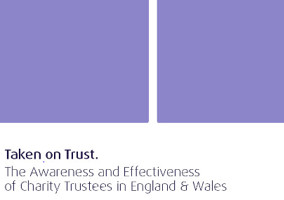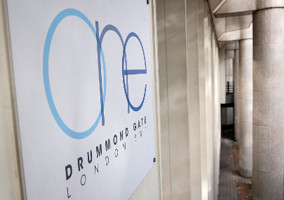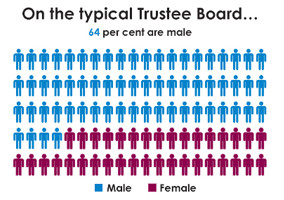Trustee boards lack legal, fundraising and digital skills, according to a major new report published today.
The Charity Commission has today published Taken on Trust: the Awareness and Effectiveness of Charity Trustees in England & Wales, based on a survey of 3,500 trustees. The survey asked trustees whether they felt their board had "sufficient skills" to address a number of different issues.
It found that the biggest skills gaps were in legal skills, marketing, digital skills, detecting and avoiding fraud, fundraising and campaigning.
Most trustees reported that their board had sufficient or mainly sufficient skills in service delivery and finance.
The report said: “Charity trustees report that they lack relevant legal, digital, fundraising, marketing and campaigning skills at board level.”
Legal responsibilities
However the report highlighted that trustees had a good grasp of their legal responsibilities.
"Previous research had indicated that as many as a third of charity trustees were not aware of their position or legal responsibilities as a trustee," the report said. "Conversely the majority of charity trustees responding to this research recognise both their standing as trustees (79 per cent) and, in general, their legal obligations when acting as trustees (82 per cent).
However, within the smallest charities some 25 per cent of trustees remain unclear that they are collectively responsible for all the decisions taken by the board, whether or not they personally contributed in any of those specific decision-taking process. Overall, nearly one in five of trustees (18 per cent) remain unclear on this point.
Legal
Overall 20 per cent said that their board was either severely lacking or had few legal skills and only half felt the legal skills on the board were sufficient.
The report suggested that “this might be due to a preference within boards to reserve legal advice to that provided by external law firms”.
Smaller organisations were more likely to say that they had insufficient skills, with less than half of charities with an income under £100,000 saying they had sufficient or mainly sufficient skills.
Fundraising
Only 26 per cent said that their board had sufficient skills in fundraising. There was little variation across different sizes of charity.
A further 28 per cent of charities said their board had mainly sufficient skills in fundraising, and 11 per cent said the question did not apply to them, while but the remaining 35 per cent said they had moderate, few, or were severely lacking in fundraising skills.
“These are disappointing results not least because trustees have important leadership roles in many different types of fundraising activity,” the report said.
Campaigning
One quarter of respondents said that campaigning skills were not required for their charity, with smaller charities more likely to feel that this was not relevant.
The report said: “Many charities do not engage in concerted campaigning activities, a factor clearly reflected in these results.”
Nearly 40 per cent said that they had sufficient or mainly sufficient skills, while 14 per cent said they had few or that campaigning skills were severely lacking.
Digital
While 80 per cent of boards had some digital representation, only 21 per cent said they had sufficient skills.
Smaller charities were more likely to report that they had sufficient skills but also that they did not think the question applied.
“It is clear that trustees have begun to embrace the onset of the digital revolution it is equally clear from these results that they require further training and development support if they are to be fully integrated to discussion at board level,” the report said.
The report calls for better training across a range of areas.
|
Related articles












